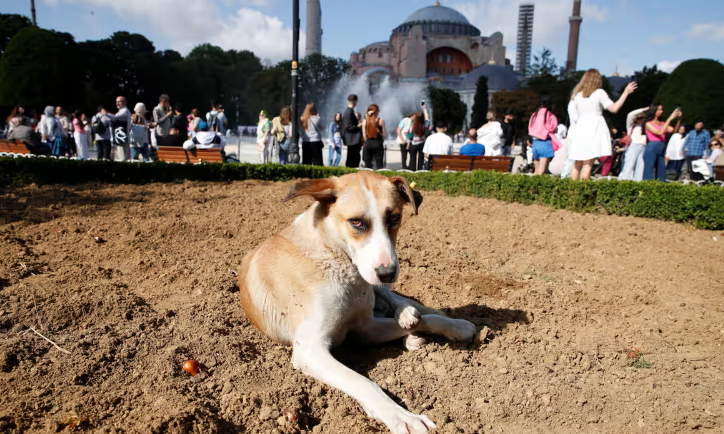For centuries these strays have been looked after and respected as part of Turkish culture. Now they’ve been dragged into the president’s culture wars.
When I first moved to Istanbul in 2010, knowing almost no one and grappling with an unfamiliar language, it was the local street dogs who first drew me into my new life. Chico, an elderly alsatian, and Herkül, a labrador mongrel, lived on a corner near my apartment where they watched the life of the neighbourhood pass by with a vigilant serenity.
Locals fed them, and I learned to my amazement that some even clubbed together to pay the dogs’ vet bills if they were sick or injured. Greeting them each day became a ritual, and when I first went to a pet shop to buy treats, using my halting Turkish to explain that I was getting them “for dogs, but not my dogs”, the shopkeeper replied: “Ahh, for the street dogs,” as though nothing were more natural.
Now the Turkish government seems intent on eradicating them with a proposed law that would round up the country’s estimated 4 million stray dogs and cull those that are not adopted within 30 days – almost certainly the vast majority.
“We have a stray dog problem that does not exist in any developed country,” said the president, Recep Tayyip Erdoğan, last month, proposing this “radical solution” to what he said was a dramatic rise in dog population, attacks and rabies cases.
Erdoğan is right, in that it is impossible to imagine this debate occurring in any other developed country – certainly not in Britain, where local authorities can euthanise un-homed stray dogs after seven days, and where bird spikes are installed around city buildings because even pigeon mess is considered economically intolerable.
Turkey, conversely, is perhaps the only country in the world where stray animals have a legal right to inhabit the street, thanks to a 2004 law passed by Erdoğan himself. That law protects a population of socialised street animals whose presence has long served as a proxy for broader social debates about notions of “development” and “civilisation”.
During the Ottoman era, Turks’ solicitude towards animals that shared their urban space was remarked upon in the accounts of almost every European visitor to the country. Dogs were a form of “public property”, wrote the diplomat Ogier Ghiselin de Busbecq, who came to Istanbul in the 1550s and described water troughs and kennels set up on the street, vendors selling scraps of meat for people to feed them, and religious foundations dedicated to their maintenance to which wealthy people left bequests in their wills.
But as the Ottoman empire declined in the face of rival European powers, foreigners and Ottoman reformists alike began to see the dogs as symbolic of a broader backwardness. “How and with what justification can the inhabitants of such a country face the brotherhood of civilised nations?” wrote Abdullah Cevdet, a founding member of the radical reformist Young Turks, in a 1908 article railing against Istanbul’s dogs.
When Cevdet’s movement seized control of the empire shortly afterwards, they enacted the city’s most infamous dog cull, rounding up thousands of them despite bitter resistance in pious Muslim neighbourhoods – where the culture was strongest – and dumping them on an uninhabited island to die a slow death of exposure, hunger and thirst.
Erdoğan’s current proposal is likely to be similarly brutal. In recent years there have been reports around Turkey of municipal officials knocking dogs unconscious and burying them alive, beating them to death with spades, or strangling them with their bare hands.
There is evidence that Turkey’s stray-dog population has grown unsustainably in recent years, with large and sometimes dangerous groups of poorly socialised street dogs roaming the fringes of cities. But the government has made little effort to enact more moderate population control measures, such as neutering campaigns and the routine chipping of pet dogs to discourage pet dumping.
An irony of the debate is that the forces that arrayed for and against the dogs appear to have switched sides. Erdoğan, a would-be champion of Turkey’s Ottoman and Islamic heritage, is being pressured to eliminate them by Islamist and rightwing activists who cast their opponents as metropolitan elites who care more about animal rights than the wellbeing of their fellow citizens.
The dog question has become another flashpoint in Turkey’s culture wars – which is again ironic, because I myself have observed that street-dog culture can be something that brings a community together. It was the dogs who inducted me into Istanbul neighbourhood life and, when volunteering at an animal shelter a few years later, I saw that the people drawn there spanned the gamut of Turkish society.
The rest of the article is here: Erdoğan’s plan to cull Turkey’s street dogs will destroy far more than just animals | Alexander Christie-Miller | The Guardian
